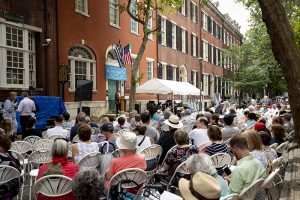Banning books, it seems to me, is a poor method for controlling language. After all, it is not books themselves that are banned but the words and ideas contained within them, and language is a very difficult thing to contain whether spoken or written. Perhaps books make language more transferable and a book a more tangible thing to police. People in power—governments, religious leaders, school boards—have been attempting it since those with the ideas started writing them down, appealing: READ THIS.
The Rosenbach’s shelves are full of books that have been challenged or banned. From the pre-printing press era (Geoffrey Chaucer’s Canterbury Tales was banned once in the 14th century and again in the 19th) to modern times (Toni Morrison’s Beloved and The Bluest Eye have been challenged or banned as recently as last week). Morrison wrote a speech, when she won the Nobel prize in 1993, that warns all of us—those with the power to make and control language—that we have the choice to share it, contain it, or kill it. She warns us that “when language dies, out of carelessness, disuse, indifference and absence of esteem, or killed by fiat…all users and makers are accountable for its demise.” She isn’t simply warning against the act of book banning, but the spirit behind it—all attempts to control or extinguish language are incendiary.
This year is the 100th anniversary of one of the most recognized banned books of all time: James Joyce’s Ulysses, the manuscript for which lives at The Rosenbach. Joyce published Ulysses in February 1922 in Paris after the novel’s earlier serialization in the U.S. was met with a lawsuit on obscenity charges. Accused of causing readers to harbor “impure and lustful thoughts,” the court’s decision banned the work in 1921. While the ruling was overturned in 1933, Ulysses has been controversial ever since—not only because of its content, but because of its format and style. It is a difficult book to read, and some of the most well-read people I know have given up before page twenty (including me, several times).
The most important thing is to know that Ulysses is a symbol of everything language can be. It broke a mold, which, like all molds, was manufactured by people. Ulysses takes the so-called limitations of language and blows right through them. It takes the rules of writing, formed over centuries, and turns them on their head. To appreciate what Ulysses did for literature, creativity, and thought, is to appreciate the power of language, how it can radically change with each individual who uses it, and how it can embody power—even if that power makes people uneasy.
In that same 1993 speech, Toni Morrison exclaims that language is the vessel through which knowledge is shared: “Be it grand or slender, burrowing, blasting, or refusing to sanctify; whether it laughs out loud or is a cry without an alphabet, the choice word, the chosen silence, unmolested language surges toward knowledge, not its destruction.” Books are one of history’s most successful vehicles for language, and let us never stop celebrating their role in disseminating knowledge, even if what they say—or how they say it—makes us uncomfortable.

As we have done for 32 years (the last two being virtual), on June 16, The Rosenbach and friends will read Ulysses aloud on our front steps on Bloomsday, a free public festival named after the book’s main character. There is no doubt this is a difficult book to read, but like other books that are difficult—whether because of format, content, or language—reading it is worth doing. It is not necessary that you like it when you are through. In fact, you may feel the opposite. That is okay.
On June 16, I will stand alongside hundreds of people on Delancey Place and listen to a book being read aloud—a book that exemplifies everything that language can do and represents how powerful words can be. On June 16 I will listen to a book being read aloud and once again be filled with hope for humanity.
